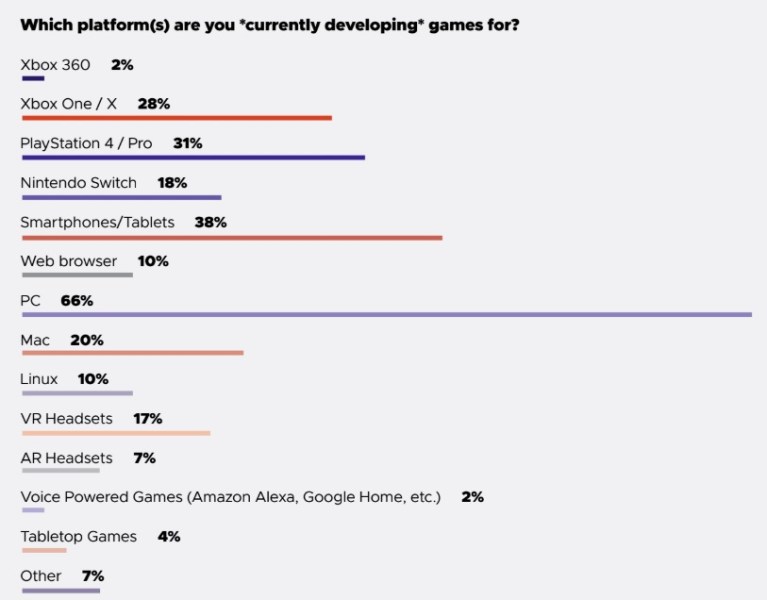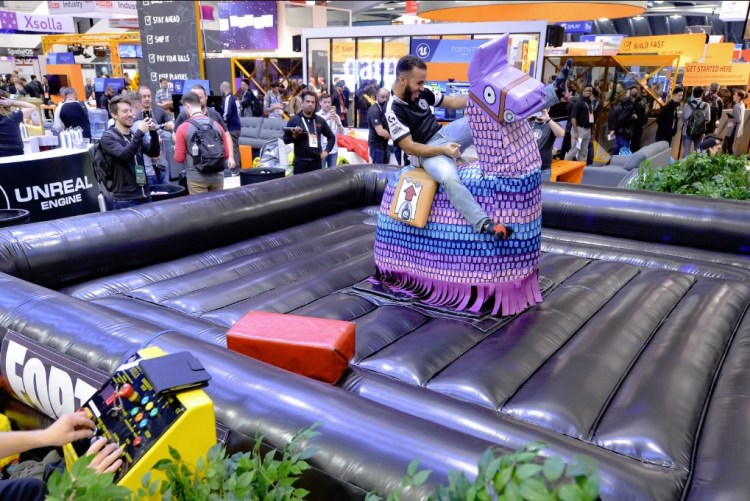GamesBeat: You’ve also worked a lot on initiatives like mentorship and the gardens and community spaces. Is there a particular goal you’re driving at with those programs?
Stern: We recognize that GDC has grown into a pretty large event. Our focus this year was on bringing it back to helping enable people to find their cohorts, the people that are like themselves, for spontaneous and serendipitous networking opportunities. We’re trying to find opportunities within the broader show to bring them back together to find more commonalities.
With the gardens, we recognize that was already a place where people coalesced, and we don’t want to mess with that. We just thought we’d add some additional amenities so they can still take advantage of the space. We created some more specific themed community spaces on the expo floor for people to have a place to set up meetings or take a break and meet up with each other. We focused this year on a few specific communities as a pilot program that are pretty obvious, smaller groups: the game audio community, the narrative writers community, and the visual artist community. We have dedicated spaces there with a lot of great content and some interesting installations and live functions happening throughout to spice up the space.
We also introduced the main space as a way to celebrate developer stories, to celebrate the community together in one large setting. It’s a way to see, all together, that one exciting, inspirational message, and then go out and find your people and make GDC your own.
June 5th: The AI Audit in NYC
Join us next week in NYC to engage with top executive leaders, delving into strategies for auditing AI models to ensure fairness, optimal performance, and ethical compliance across diverse organizations. Secure your attendance for this exclusive invite-only event.
GamesBeat: Is the GDC Cares initiative something brand new?
Stern: It is, yeah. We’re kicking that off this year with a really simple sock drive. It provides socks to one of the local non-profit organizations that supports homeless and at-risk families. It’s a simple, immediate return on people’s investment. We’re kicking it off with a donation of about 500, initially, for men and women. We’re trying to make sure we’re doing our part in giving back to the community that lends itself to us while we’re here. We also partner every year with Indie Giving, and they’re supporting a couple of organizations this year that also support the homeless. It’s one of the topics that our community is very passionate about.

Above: Virtual reality demo at GDC 2018.
GamesBeat: Looking at the makeup of GDC, do you know how many people are students or young professionals, the targets for the mentorship program?
Stern: We’re looking at the mentorship program as something more broad than just addressing students. We have very dedicated student content on Friday, but we want to enable developers at any stage in their career to access support so they can continue to stay within their careers. That can be anything from how to manage a team to how to manage your career, portfolio reviews, interview skills, whatever it is that you feel you need a little extra oomph behind to be successful and stay in the industry.
We see so much turnover in the indie side of the space, and in the triple-A side of things as well. If your studio closes and you need to reinvent yourself and find a new path, how do you do that? We wanted to provide an opportunity for more formalized collections and allow people to access more veterans to have more real conversations. It’s harder to do that in the kind of hallway conversations that you have in passing. We’re excited about launching that this year.
GamesBeat: How is the representation from overseas? Have you heard any stories about people getting their visas or not this year?
Stern: Our representation is still pretty strong, all things considered. We’re still about 30 percent international attendees, which is larger than most conference averages in the U.S. I haven’t heard any specific feedback around approvals or denials of visas this year, any more than in any other year. Obviously we do our best to help provide application letters for folks so we can do our part in helping people get the travel documents they need, but unfortunately there’s only so much we can do as a conference organizer.

Above: The GDC survey results on the most popular game platforms for developers.
GamesBeat: Women’s issues were a big topic in the game industry last year. Do you see that reflected in GDC in particular ways?
Stern: I haven’t checked our diversity breakdown this year in our registration. We won’t have a better idea of that impact until after the show. But we always strive to make sure we’re creating an environment that feels safe and welcoming for people, and that we’re scheduling a larger than average percentage of women in our conference programs.
We partner a lot with community organizations to enable women and other underrepresented segments of the market to attend the event if they didn’t have the means or the support from the organizations they work for to otherwise attend. We obviously partner with the AIAS Amplifying New Voices program to help provide media and other training to women so we can empower them to grow their careers. The IGDA also launched a speaker diversity initiative this year, which we help support and promote. We do what we can from an organizational perspective to help create an environment that’s supportive and welcoming and fostering that segment of the market.
GamesBeat: The results from the survey on developers working more than 40 hours a week, was there anything interesting in that?
Stern: We noticed that people’s self-reported numbers were different in the survey than what we hear when people talk about them elsewhere in the space. We were surprised by how those numbers played out this year. They didn’t necessarily match what we thought they would before we did the survey.
GamesBeat: Do you think anything is going to stand out from the awards show?
Stern: We’re really excited about our two special awards this year, for lifetime achievement and pioneer. It’s exciting to see two women at one time on the stage. It’s obviously not the first time we’ve awarded those, but it’s great to see that representation and recognition. Our award winners are a great, diverse group of folks. It’ll be exciting to watch the announcement of all of those. It’s going to be a good year.

Above: A small percentage of game developers are working on next-gen projects.
GamesBeat: I’m always interested in some of the postmortems on retro games. Command & Conquer is coming up. Those are pretty popular and well-attended.
Stern: Definitely. We’re excited to have a nice lineup of post-mortems this year. Mike Dailly, with Lemmings, he’s so excited. He’s like a one-man hype show for GDC right now, which is a lot of fun. We also have Paperboy, which is another one people have fond memories of playing when they were younger. I think we have four or five this year. It’s fun to get one of the older Spider-Man games in there, talking about that juxtaposed with all the brand new Spider-Man content coming out. That’s fun, to be able to do both the old and the new in the same show.
GamesBeat: We’re seeing more announcements at GDC nowadays. In the past, you’d have keynote speeches, and we had things like the original Xbox announcement. Now we have company-sponsored events from Amazon and Google and Epic and the like, and those are getting interesting as far as producing a fair amount of news. What do you notice about that trend?
Stern: We saw a bit of that creeping in last year, and we’re seeing it in full force this year. It’s exciting that they think of GDC as a place where they want to get their message out – that we have the right audience for them, and it’s where they want to make their big splash. We’ve heard from a few folks that they use GDC strategically as a launch site for new campaigns for whatever they’re announcing.
As we see more and more of these big players have their own user conferences and things along those lines, they’re used to having their own crafted, curated experiences to create these kinds of messages. It made more sense for us as a show to allow them a platform to do that in their own way. That’s why we don’t do the keynotes and product announcements. As part of the show content, they can be considerably more meaningful. We can allow them the opportunity and space to do it in a way that’s unique to their brand and their voice and how it fits within the broader GDC context.
Some people are excited about those announcements, and some people are coming just to learn and they don’t care. We wanted to provide that balance for everyone. I wouldn’t be surprised if we continue to see this path a bit more in the next couple of years, as new announcements are occurring. It’s an interesting shift in how people approach their big announcements.


